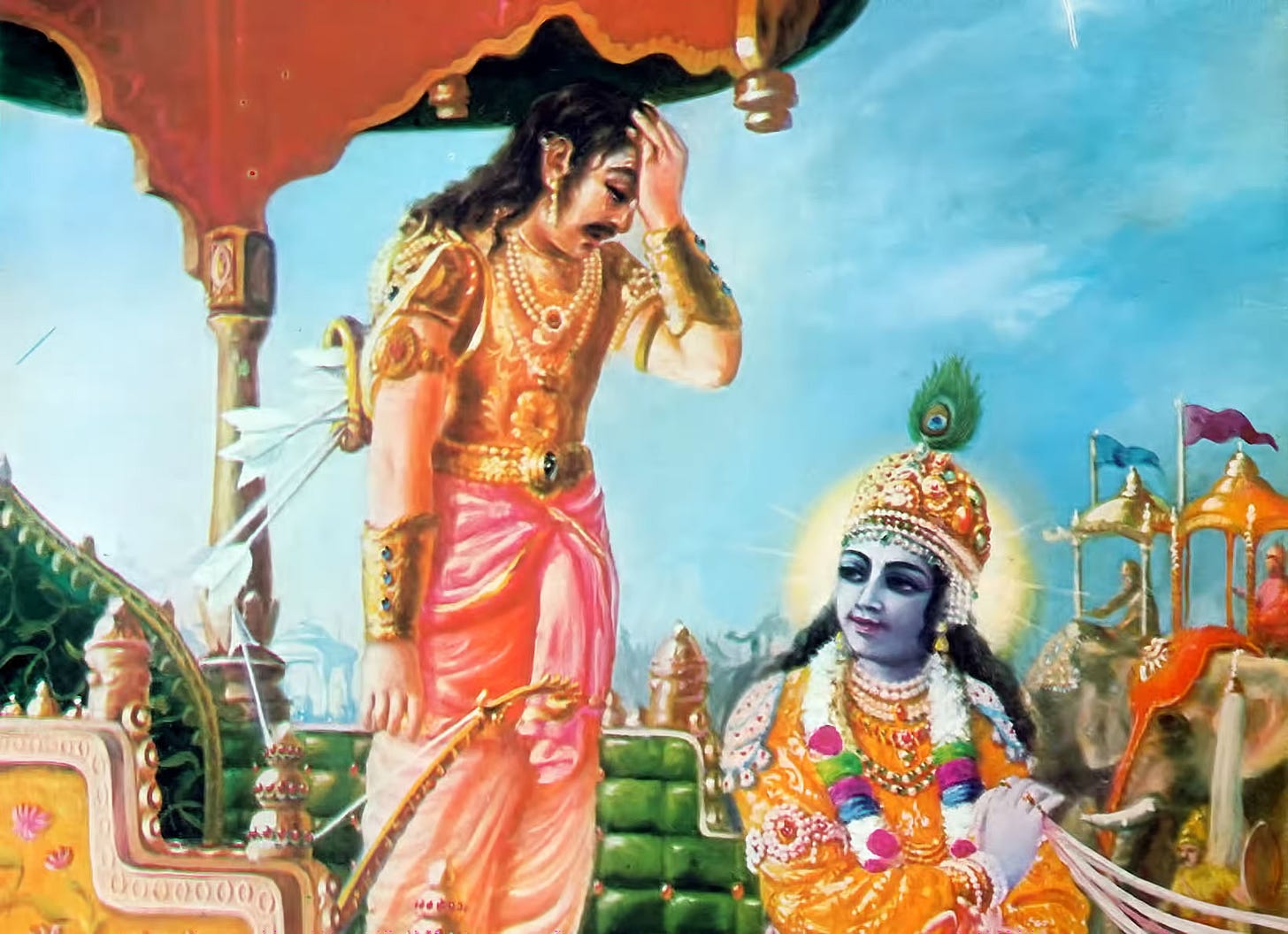Bhagavad Gita Chapter 2 verse 4
Ego, Attachment, and Arrows: Unveiling the 'REAL' Reason Behind Arjuna's Hesitation
अर्जुन उवाच | कथं भीष्ममहं सङ्ख्ये द्रोणं च मधुसूदन | इषुभि: प्रतियोत्स्यामि पूजार्हावरिसूदन || 4||
Translation: Arjuna Said:** O Madhusudan! Bhishma and Drona are my teachers fit to be worshipped. How can I attack them with arrows in the battle?**
When you first read The Gita, you might find yourself nodding along with Arjuna's arguments. It's easy to see why - dealing with clear-cut evil is straightforward, but it's much trickier when that evil disguises itself as good. Our mind is a master storyteller, capable of justifying both lies and truth. But don't be fooled - they don't have the same effect on us.
Truth vs. Lies: The Hidden Impact
Speaking truth: Your words gain power, your self-confidence gets a boost.
Lying: Might feel justified, but lacks the same impact. (Don't believe me? Check out how lie detectors work - they pick up on the subtle stress of deception.) Though, I wonder if it would explode if I hooked it to some politicians :)
There is a difference, that becomes more clear as you start walking on the path of truth.
A Surprise: It's All About Ego
Dive deeper and you'll see - it's not truth or lies we're really defending, but our ego. We cling to our beliefs, even when they're wrong, because admitting we're mistaken hurts our EGO and one component that forms our ego (me-self) is attachment.
Attachment in Disguise
Arjuna claims it's about respecting Bhishma and Drona, but that's not the whole story. It's his ignorance of the ‘Bigger Picture’ to think that, which Krishna will clarify in following verses. Arjuna doesn't really care about Bhishma or Drona, but his attachment to them.
The Selfishness of "Love"
All of us are very selfish we care only about ourself, that is even if we do good for others, if we were not then why can’t we love everyone unconditionally as Lord Krishna. We like to think we're kind and loving, but let's be real - it's often self-centered. Love is just a pleasant state in your own mind. We struggle to love strangers because we lack shared memories and attachments with them. Arjuna's "love" for his teachers is, in this moment, more about his own comfort and faint-heartedness than true respect or duty, as Lord Krishna will clarify in following verses.
How We Deceive Ourselves
Our minds are expert con artists, convincing us to see good in evil. This is how dictators rise to power and how we justify harmful behaviors to ourselves (like saying "Just one drink won't hurt..."). It happens when we have a strong desire or attachment for something. In these moments, your mind transforms into a clever lawyer, presenting arguments not for what's right, but for what you want. And just like a seasoned lawyer, it never lets the truth get in the way of a good argument - though unlike real lawyers, it doesn't charge us hourly for its services.
Breaking Free: Practical Steps
Practice Delayed Gratification
When emotions run high, be a rock
Stop everything
Tell yourself: "If it's right, I'll do it later"
Let the emotions pass, then think RATIONALLY
Develop Self-Awareness
Regularly question your motives
Ask: "Am I justifying this because it's right, or because I want it?"
Just accepting our truth, goes a long mile. Desires are power and can’t be won over in a day. As we move to following verses we will start getting our answers.
Be Mindful.
Observe your thoughts without judgment
Create distance between you and your mind's stories
Remember, your mind is clever, but you can be cleverer. By implementing these strategies, you'll make choices aligned with your true values, not just your mind's convincing narratives. It takes practice, but it's worth it. You'll gain clarity, make better decisions, and maybe even find a bit of that unconditional love like the Lord. Don't judge yourself if you are unable to win over your mind; just stay true to yourself and observe. Don't let your mind deceive you even once. Accept your reality. As we discuss further verses, Lord Krishna will guide us all to overcome our weaknesses.




